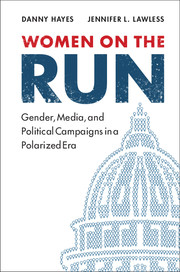Book contents
- Frontmatter
- Contents
- List of figures
- List of tables
- Acknowledgments
- 1 Gender, myth, and reality on the campaign trail
- 2 Rethinking and reassessing gender differences on the campaign trail
- 3 That's what she said, and so did he
- 4 Sex is no story
- 5 The party, not the person
- 6 The origins and implications of perceptions of gender bias
- Appendices
- Works cited
- Index
2 - Rethinking and reassessing gender differences on the campaign trail
Published online by Cambridge University Press: 05 May 2016
- Frontmatter
- Contents
- List of figures
- List of tables
- Acknowledgments
- 1 Gender, myth, and reality on the campaign trail
- 2 Rethinking and reassessing gender differences on the campaign trail
- 3 That's what she said, and so did he
- 4 Sex is no story
- 5 The party, not the person
- 6 The origins and implications of perceptions of gender bias
- Appendices
- Works cited
- Index
Summary
In the fall of 2010, Connecticut's 4th and California's 47th congressional districts appeared to have little in common. Separated by nearly 3,000 miles, the Connecticut 4th was nestled next to the Long Island Sound, whereas the California 47th was landlocked in Orange County. Demographically, the Connecticut 4th was nearly 80 percent white; California's 47th was majority Latino. And the average high temperature on Election Day in the districts’ biggest cities? A crisp 53 degrees in Bridgeport, but a balmy 72 in Santa Ana.
For all of the districts’ obvious differences, the midterm campaigns for the U.S. House seat in each turned out to be strikingly similar. Both Democratic incumbents – Jim Himes in Connecticut and Loretta Sanchez in California – faced serious challenges from Republican state legislators. Himes found himself in the crosshairs of State Senator Dan Debicella, and Sanchez was locked in a battle with Assemblyman Van Tran. Although Barack Obama won each district with about 60 percent of the 2008 presidential vote, neither House race was a Democratic slam dunk.
Himes and Sanchez sought to protect their seats in part by outraising their Republican opponents, both by about two to one. This fundraising advantage allowed them to run a stream of ads touting what they characterized as an improving national economy that had been pulled back from the brink of collapse by the actions of a Democratic president. Himes and Sanchez also highlighted and defended their support of the Affordable Care Act, which had passed the House that spring with exclusively Democratic votes. According to data from the Wesleyan Media Project, about 75 percent of the policy discussions in Himes and Sanchez's ads dealt with the economy or social welfare issues, such as health care.
Debicella and Tran, meanwhile, characterized the previous two years as an economic and fiscal disaster owing to the failures of the Democratic Party. They repeatedly told voters to send a more independent voice to Congress. “If you agree that Washington is getting it right, then vote for Jim Himes,” Debicella said in an October 24 debate. “He's voted over 94 percent of the time with [Speaker of the House] Nancy Pelosi.” Tran, in announcing his bid for Sanchez's seat, told a crowd that “The district needs a real representative and not a rubber stamp for Nancy Pelosi.”
- Type
- Chapter
- Information
- Women on the RunGender, Media, and Political Campaigns in a Polarized Era, pp. 12 - 32Publisher: Cambridge University PressPrint publication year: 2016



